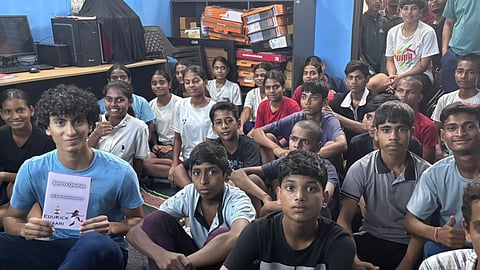

When Vir Shrinagesh speaks about opportunity, he doesn’t describe it in grand theories or statistics. He remembers faces — like that of a 15-year-old footballer named Anjali, sitting in a narrow classroom in Sangam Vihar, listening with quiet determination. That day marked the beginning of EduKick Naari, a youth-driven initiative that would go on to transform how young women athletes in India think about higher education.
Vir, a national-level footballer and student leader, grew up surrounded by the contradictions of India’s sports system; one where girls can excel on the field but remain excluded from the academic pathways their talent should open. During an early outreach session, a group of athletes asked him a simple question: “Do sports quotas really work for girls like us?” Their uncertainty stayed with him.
He began researching India’s existing sports-quota policies and affirmative-action schemes that reserve university seats for accomplished athletes. What he discovered was striking: many of the very students these programs were designed to benefit had no idea they existed. In the first survey EduKick Naari conducted, even top-ranked athletes from under-resourced schools admitted they didn’t know how to access these opportunities. The problem wasn’t a lack of policy; it was a lack of awareness.
That realisation shaped Vir’s mission. He decided EduKick Naari would focus not on charity but on clarity, and on giving girls the information and confidence to claim what they had already earned. Partnering with five community organisations, he and a small team began organising workshops that explained how to document sports achievements, apply under specific eligibility categories, and meet the deadlines universities require. To make the material accessible, he wrote a practical guidebook in both Hindi and English, distributed through schools and NGOs.
Since that first cramped workshop in Sangam Vihar, EduKick Naari has reached more than a hundred young athletes across Delhi, Haryana, and Rajasthan. Its impact has been recognised nationally, earning Vir a spot on Deakin University’s Top 30 NextGen Changemakers list. But for him, the true reward isn’t in awards, it’s in moments of realisation. He recalls seeing the expression of a girl who, for the first time, understood that her years of training could secure her a college seat. “That look,” he says, “was the proof that the system could finally work for her.”
Vir Shrinagesh’s journey shows how a single insight — that awareness can be as powerful as access — can reshape lives. What began as one student’s answer to a question has grown into a movement that helps girls translate their athletic discipline into academic opportunity. For the young women of EduKick Naari, the message is simple yet radical: their dreams are not a distant hope; they are a right waiting to be claimed.
